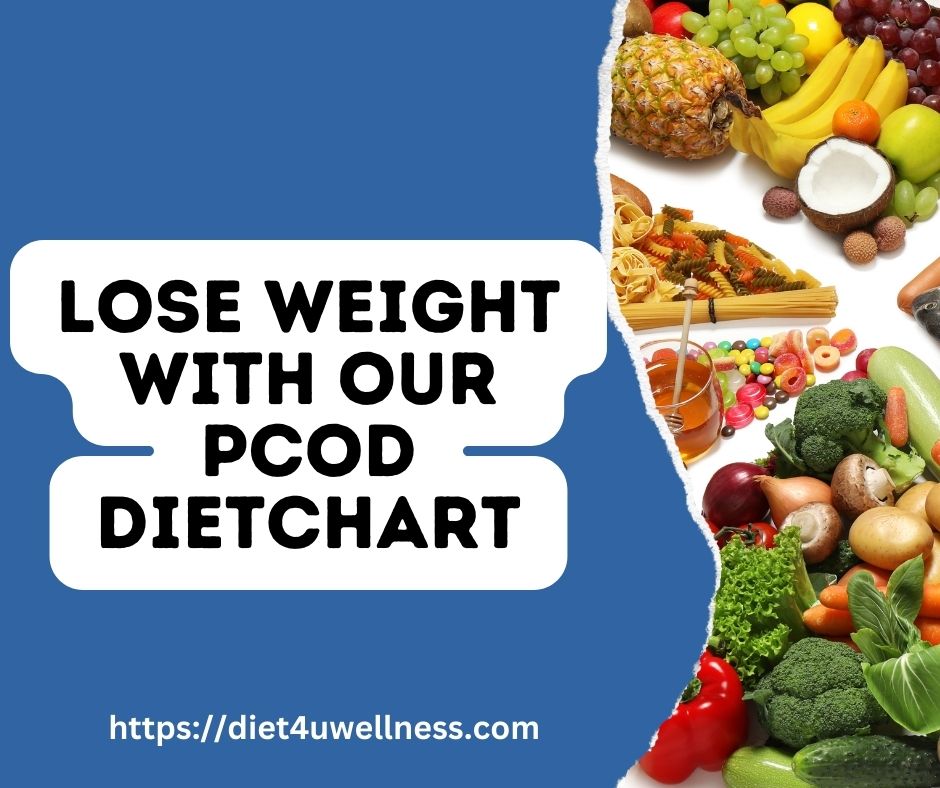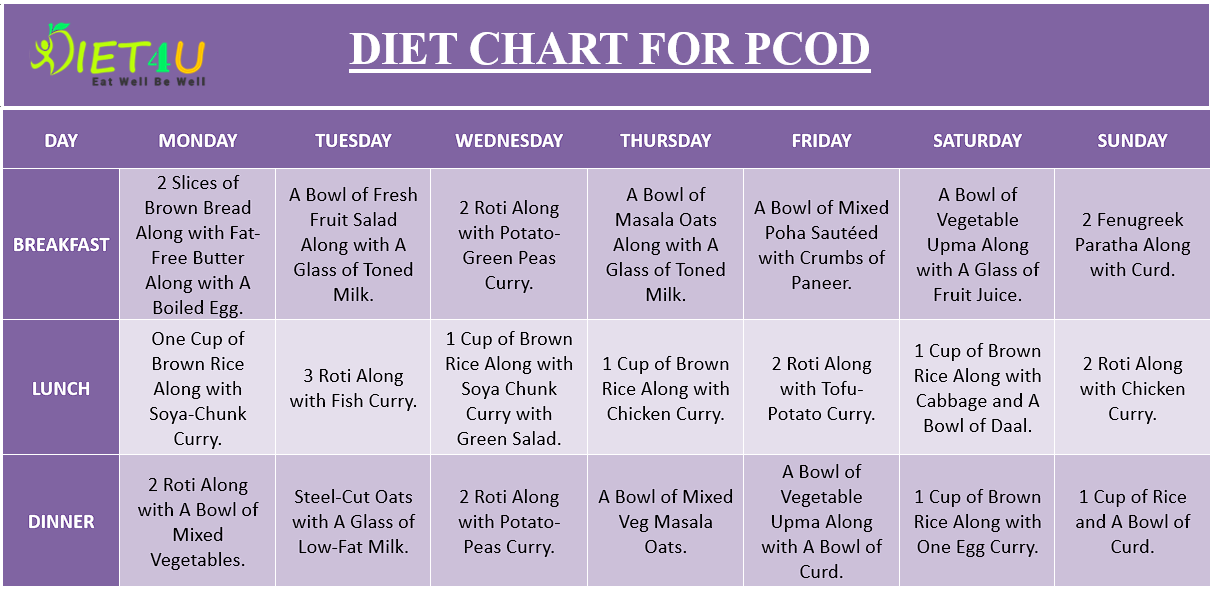
Achieve Your Goals with a PCOD Diet Chart for Weight Loss
Table of Contents
What is PCOD?
PCOD or Polycystic Ovarian Disease. PCOD is often used synonymously with PCOS. However, these two are not alike. PCOS is Poly Cystic Ovarian Syndrome. The syndrome is a term used to define a “collection of symptoms.”
In PCOD, the ovaries harvest multiple “cysts” in the various portions of the female reproductive organ, like the ovaries, fallopian tract, and uterus. However, in PCOS, endocrine abnormalities lead to the production of excess androgens (male reproductive hormone), which leads to an abnormal menstrual cycle and other fertility issues in a reproductively active woman. PCOD Diet Chart for Weight Loss can help to regulate menstrual cycle.
PCOD Vs PCOS
| PCOD | PCOS |
| Poly-cystic Ovarian Disease | Poly-cystic Ovarian Syndrome |
| The production of immature eggs at abnormal times leads to irregular or scanty menstrual cycles | Due to much more severe endocrine issues. |
| Lifestyle changes, exercises, healthy eating habits can reverse the conditions of PCOD. | Along with lifestyle changes, often medications might be required like contraceptive pills. |
| Less serious condition. | It’s a much more severe condition. In extreme cases, it could lead to reduced fertility. |
In this 21st century, PCOD has become a very common endocrine disorder affecting the reproducing female population of the globe. PCOD, being the less serious of the two, doctors often suggest a better lifestyle to be a better alternative to medicines. Regular exercise and a balanced, nutritious diet are critical aspects of a healthier lifestyle.
This article by DIET4U WELLNESS discusses the importance of a balanced diet to control PCOD. The article discusses all the various foods to include in the daily diet and which specific food items to avoid to lead a healthier lifestyle. Multiple research studies have proved that a proper PCOD diet chart for weight loss can help regulate endocrine issues and control hormonal abnormalities. However, it is not possible to have one single diet that would cater to the enormous population of ladies suffering from PCOD. Diet is something that should be unique to one particular individual.
Foods to Eat in PCOD Diet Chart for Weight Loss
- Healthy Fat: People often mistake fats for good health. However, it is nothing but a misconception. Carbs, protein, and minerals are essential for proper body basal metabolism like other components. Fats act as energy reserves that the body breaks down and uses when there is no immediate source of energy available for the body to sustain. One can consume nuts like walnuts, almonds, seeds like pumpkin seeds, flaxseeds, chia seeds, etc., to maintain a healthy fat level in their body. These fats do not affect cholesterol levels; they help reduce inflammation and balance the hormones in patients suffering from PCOD.
- High-fiber diet: High-fiber foods like brown rice, quinoa, spinach, and other leafy vegetables are known to regulate blood glucose levels. PCOD, which often includes insulin resistance, leads to frequent spikes in glucose levels. Thus, physicians and dieticians prescribe such a high-fiber diet.
- Carbohydrates with low GI: Carbohydrates are the primary energy source in one’s diet. Consuming carbohydrates, especially those that do not increase blood sugar levels, is essential. Food items like whole-grain noodles, pasta, sweet potatoes, and oats are examples of carbohydrates with low glycemic index; hence, they would not cause any harm to one’s body.
- Green-leafy vegetables: Items like spinach, kale, and cabbage are high in dietary fiber. Hence, this provides the daily roughage essential to ensure proper bowel movement. These green vegetables are rich in vitamin K, folate, and minerals like iron. As people with PCOD often suffer from hormonal imbalance, these vitamins and minerals help regulate the hormone levels in the body, negating the common symptoms in day-to-day life.
- Antioxidant-rich food: Antioxidants are substances that destroy the harmful super oxides produced as a by-product of normal metabolism. These super oxides lead to hormonal imbalances, premature aging, and many other skin and health problems. So, consuming antioxidant-rich foods like berries (strawberries, blueberries, raspberries) is a great and tasty option.
Foods to Avoid in PCOD Diet Chart for Weight Loss
- High-sugar food: Food items like cakes, pastries, candies, and chocolates fall under “highly sugary food.” These might taste and feel good when consumed, but they could be better regarding health and nutrition. They can lead to blood glucose level spikes, which in turn would lead to hormonal imbalances, something a PCOD patient would not want at all. High sugar is considered to act in a similar way to a “drug” and gives one a “sugar rush.”
- Processed/Ready-made food: Food like ready-to-eat items, canned fish, and packaged noodles are loaded with chemical preservatives and high salt to ensure their longer shelf-life. These preservatives are not the best for health. They also contain unhealthy fats, which would increase LDL levels and refined sugar. They can interfere with the already evident hormonal imbalances in the body and deteriorate the problems of insulin resistance, high blood glucose, etc.
- Highly caffeinated products: In the fast-paced modern world, people often resort to coffee and other caffeinated products like green tea, candies, gummies, etc. Even though caffeine can provide that instant “kick” or “energy boost,” it can cause severe hormone imbalance when not consumed in moderation. Caffeine is a highly addictive substance; hence, keeping it in check often becomes a challenge. Therefore, for people with PCOD and other hormonal issues, it is advised to stay away from such caffeinated products.
Essential Tips for Weight Loss Diet Chart for PCOD Patients
People often do not consider taking a consultation with a dietician or a nutritionist when diagnosed with conditions like PCOD. A gynecologist should be contacted, but they can only give medicines; other measures, like diet charts, nutritional tracking, etc., must also be considered. Dietitian Rukhsana Azhar is known for providing a one-stop solution to diet and health charts for PCOD-suffering women. In this article by DIET4U WELLNESS, there is a 7 day weight loss diet chart for PCOD sufferers, which could benefit a huge section of society.
7 Day PCOD Diet Chart for Weight Loss

FAQs Regarding PCOD Diet Chart For Weight Loss
Q: Is PCOD curable or not?
As harsh as it may sound, as of now, there is no permanent cure for conditions like PCOD/PCOS. It’s more of a symptom management, which could help in controlling the harmful effects caused by PCOD. Lifestyle changes and regular workouts are the only solutions for now.
Q: Does PCOD make one infertile?
It is a prevalent misconception. People often think having PCOD is synonymous with being unable to conceive a child. This is not true. However, neglecting symptoms of PCOD could eventually lead to other associated reproductive ailments like blockage of the fallopian tube, endometriosis, chocolate cysts, etc., which would lead to infertility.
Q: Why is PCOD so common nowadays?
PCOD affects menstruating women irrespective of whether they’re sexually active or not. PCOD has always been a problem, but cases have been on the rise in the recent past, and the reason behind it is unhealthy lifestyles. Lack of exercise, packaged food, and fast-paced life have added to the hormonal issues in people.
Q: Does PCOD have irregular periods?
Even though it’s not a rule, often, women suffering from PCOD do have irregular periods. It could make the periods heavier, scantier, or immensely painful. A physician and dietician should be consulted as soon as possible. PCOD Diet chart will help you to regularize the menstrual period.
Q: Is PCOD genetic?
It has not been scientifically proven yet. However, it has been seen that if someone’s mother or sister has had PCOD, then the next generation is at a higher risk of being diagnosed with PCOD.

Hello My Name is Dt. Ruksana Azhar and I am a certified dietician and providing online & offline services for Weight Management, PCOS/PCOD Management, Diabetes Management , etc. I have 12+ years of experience in the Apollo Hospital Delhi , Max Super Specialty Hospital Delhi, Lilavati Hospital Mumbai and VLCC healthcare Mumbai. I loves to write healthcare and lifestyle related blog. My favorite part of being a doctor is the opportunity to directly improve the health and wellbeing of my patients and to develop professional and personal relationships with them.



